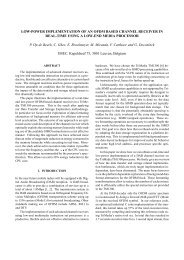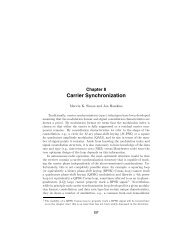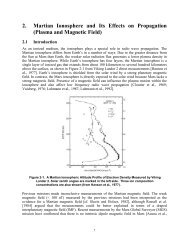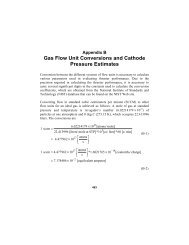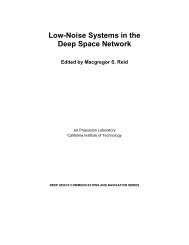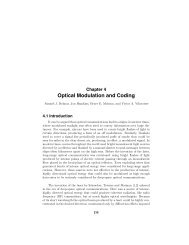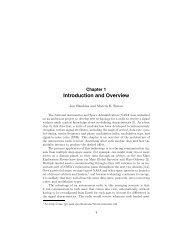Propagation Effects Handbook for Satellite Systems - DESCANSO ...
Propagation Effects Handbook for Satellite Systems - DESCANSO ...
Propagation Effects Handbook for Satellite Systems - DESCANSO ...
You also want an ePaper? Increase the reach of your titles
YUMPU automatically turns print PDFs into web optimized ePapers that Google loves.
The results of these two techniques <strong>for</strong> 11.7 GHz data both from<br />
VPI&SU and the University of Texas (C.W. Bostian, et al-1979) are<br />
shown in Figure 6.6-1. Clearly these results indicate a wide spread<br />
of values have been obtained to date even though they are averaged<br />
over an entire year. The attenuation has been truncated at 5 dB<br />
because of the effects of ice depolarization (see Section 6.6.3).<br />
VPI&SU has also related the XPD to attenuation <strong>for</strong> each month of<br />
1978 <strong>for</strong> which 5 dB or greater fades occurred. These ~ and ~<br />
results are shown in Table 6.6-1 <strong>for</strong> the number of half-minute<br />
samples indicated. The R 2<br />
term, a correlation coefficient, is a<br />
measure of the goodness of the fit. The wide variations noted are<br />
simalar to those observed by other investigators.<br />
Additional data from the University of Texas at Austin (Vogel -<br />
1979) incorporating exceedance values is presented in Figure 6.6-2.<br />
These curves show the 10%, 50% (median) and 90% expectation of<br />
exceeded isolation <strong>for</strong> each attenuation. For example at 5 dB<br />
(meaning 4 dB S A S 5 dB) the XPD exceeded 23 dB <strong>for</strong> 90%, exceeded<br />
28 dB <strong>for</strong> 50% and exceeded 33 dB <strong>for</strong> 10% of the data. The<br />
logarithmic fit to these three curves is<br />
10% : XPD - 42.9 - 17.5 logloA<br />
50% : XPD - 35.8 - 13.4 loglOA<br />
90% : XPD - 31.5 - 12.6 logloA<br />
6-108<br />
-<br />
-.




